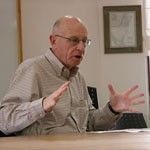By Ira Sharkansky, Ph.D

JERUSALEM — He’s 79, eligible for residence in our retirement village. But still active. A resident of Delaware, and a U.S. senator then vice president since 1973. Israeli politicians are claiming that he’s visited Israel more times than any other president, but that may reflect little more than his long service at the peak of U.S. politics.
He claims to be a Zionist, and has demonstrated a close affinity for Israel and its needs.
His recent visit featured several declarations and actions, both here and by the Saudis. Israeli planes can now fly over Saudi Arabia to reach the far east, and Israeli Muslims can fly directly to Saudi Arabia for the purpose of their pilgrimage in Mecca.
These actions are part of an inching closer together, still held apart, apparently by Israel’s dicey relations with the Palestinians.
That, too, was part of President Joe Biden’s visit, with some details announced about an inching ahead on the Palestinian front. The U.S. still adheres to a two-state solution, but that’s something for the future, perhaps.
The highway was closed to all traffic but the president’s substantial number of vehicles somewhat before and after his trip from the airport to Jerusalem. And the same for city streets surrounding his visits to Yad Vashem, his hotel, and then to Bethlehem. The number of vehicles that accompanied him was huge, and included an ambulance and fire truck.
When asked by a South African friend about my president, I responded about our president. No other official would be treated with the care for his safety like the American president. As far as we’re concerned, he’s the equivalent of the world leader.
Several comments of friends have reminded me of what my grandmother would be saying. If only he could leave here without damage. The Jews would be free of guilt.
Was there too much coddling and details of his visit? Maybe.
Biden may be getting close to the end of his long career. U.S. inflation has reached beyond 9 percent during this visit, and his polling, like that of his Israeli hosts, is far from promising an easy re-election.
Who’s next? Here and there? What about polling that finds younger Americans are less supporting of Israel than Biden’s age group?
Here, Yair Lapid was outgoing in inviting Naftali Bennett and Benjamin Netanyahu to participate in the welcoming ceremonies. We’re more than 100 days from our election, and the lineups are not finalized. Commentators are filling the airwaves with their wind. We can speculate along with them, but we’ll defer. There are more questions than answers, both about U.S. and Israeli politics, and the relations between the two countries.
An American friend has moaned about the weakening relations between Israel and U.S. Jews, except for the Orthodox and Haredi. It’s not like in years past, but neither is Israel. It’s now a more powerful and self-reliant country, with a successful economy and inflation less than half that of the U.S. And its politics are divided and contentious, leading activists to focus on domestic affairs rather than dealing with the feelings of American Jews. They, too, seem to be stronger than in the past, despite occasional indications of vulnerability. Also, there is much more intermarriage, and questions about who is a Jew?
Overall, the war between Russia and Ukraine is more prominent, and more influential on us all than the attitudes of American Jews and Israelis toward one another. That war has affected prices of fuel and bread, along with everything else. And brought the spectre of hunger to the fore in poorer countries and among poorer individuals within the wealthier countries.
After Israel and the Palestinian territories was the president’s visit to Saudi Arabia. As far as is apparent, no great breakthrough there. Lots of high level talk about the Saudi leader’s responsibility for the killing of Jamal Khashoggi, and not much progress on getting the Saudis to pump more oil.
Then off to America, and no sign of the trip helping Biden’s standing.